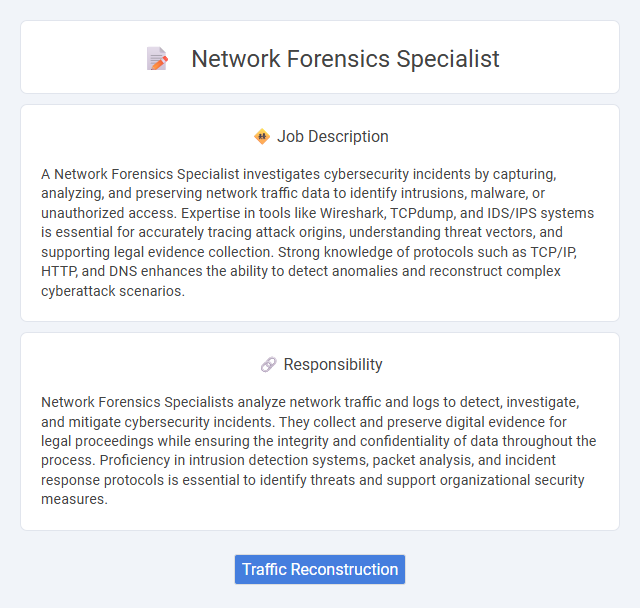
A Network Forensics Specialist investigates cybersecurity incidents by capturing, analyzing, and preserving network traffic data to identify intrusions, malware, or unauthorized access. Expertise in tools like Wireshark, TCPdump, and IDS/IPS systems is essential for accurately tracing attack origins, understanding threat vectors, and supporting legal evidence collection. Strong knowledge of protocols such as TCP/IP, HTTP, and DNS enhances the ability to detect anomalies and reconstruct complex cyberattack scenarios.
Individuals with strong analytical skills and a keen attention to detail are likely well-suited for a Network Forensics Specialist role, given the need to investigate complex cyber incidents. Those who can remain calm under pressure and have a solid understanding of network protocols and security measures may find this job particularly fitting. Conversely, people who struggle with methodical problem-solving or lack patience for detailed data analysis might find the demands of this position challenging.
Qualification
A Network Forensics Specialist must have a strong foundation in cybersecurity, with expertise in packet analysis, intrusion detection systems, and digital evidence collection. Proficiency in tools like Wireshark, TCPdump, and forensic suites such as EnCase or FTK is essential for analyzing network traffic and identifying malicious activity. Certifications such as Certified Network Forensics Examiner (CNFE) or GIAC Network Forensic Analyst (GNFA) significantly enhance credibility and career prospects in this role.
Responsibility
Network Forensics Specialists analyze network traffic and logs to detect, investigate, and mitigate cybersecurity incidents. They collect and preserve digital evidence for legal proceedings while ensuring the integrity and confidentiality of data throughout the process. Proficiency in intrusion detection systems, packet analysis, and incident response protocols is essential to identify threats and support organizational security measures.
Benefit
Network Forensics Specialists likely provide significant benefits by enhancing an organization's ability to detect, analyze, and respond to cyber threats effectively. Their expertise probably reduces the risk of data breaches and system compromises, leading to improved overall cybersecurity posture. Employing such specialists may also contribute to faster incident resolution and compliance with regulatory requirements.
Challenge
Network Forensics Specialists likely face the challenge of rapidly identifying and analyzing complex cyber threats within vast amounts of data. The evolving nature of cyberattacks may require continuous adaptation to new technologies and methods to effectively trace intrusion paths. Success in this role probably depends on strong analytical skills and staying current with the latest cybersecurity trends.
Career Advancement
Network Forensics Specialists leverage advanced cybersecurity skills to analyze and investigate network breaches, enhancing organizational security frameworks. Mastery in digital forensics tools, intrusion detection systems, and threat intelligence accelerates career progression toward roles such as Cybersecurity Analyst, Incident Response Manager, and Chief Information Security Officer (CISO). Certifications like GIAC Network Forensic Analyst (GNFA) and Certified Cyber Forensics Professional (CCFP) significantly boost professional credibility and advancement opportunities.
Key Terms
Traffic Reconstruction
A Network Forensics Specialist skilled in traffic reconstruction analyzes captured network packets to recover detailed communication sessions, revealing data flows and potential cyber threats. Utilizing advanced tools like Wireshark and NetworkMiner, this role decodes encrypted or fragmented traffic to trace intrusions and unauthorized transmissions. Mastery of protocols such as TCP/IP, HTTP, and DNS supports accurate timeline creation and incident response in complex network environments.
 kuljobs.com
kuljobs.com